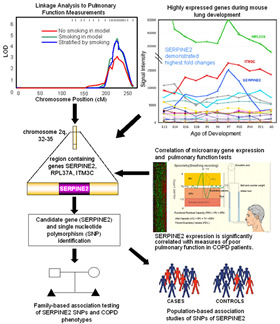SERPINE2 as a Genetic Determinant of Lung Function

COPD represents the fourth leading cause of death in the United States, and is predicted to become the third most common cause of death and the fifth most common cause of disability in the world by the year 2020 [1]. COPD is often induced by direct or passive exposure to cigarette smoke. Prolonged cigarette smoke exposure can lead to inflammatory cell recruitment followed by mucociliary dysfunction, airway wall thickening, airspace destruction and emphysema. Deficiency in the activity of a1-antitrypsin/SERPINA1 is a major factor of genetic susceptibility for the development of emphysema. Overwhelming evidence suggests the presence of additional genetic factors contributing to the development of COPD in the general population. Using a combination of genetic linkage, microarray gene expression and genetic association studies we have identified serine protease inhibitor (SERPIN) E2 as a novel candidate susceptibility gene for COPD. SERPINE2 is a major tissue and cell-associated inhibitor of thrombin and plasmin, but not elastase, and has been shown to promote extracellular matrix production and inhibit apoptosis. The role of this protein in the pulmonary system has not been previously explored. We have shown that: 1) The gene for SERPINE2 lies within a previously defined linkage region for early-onset COPD on chromosome 2, with maximal evidence for linkage when assuming a gene-by-smoking interaction; 2) SERPINE2 expression is regulated during lung development, with maximal expression coincident with establishment of alveolar structure; 3) SERPINE2 expression is significantly correlated with measures of poor pulmonary function in human COPD patients; 4) Genetic association with COPD is observed for multiple SERPINE2 polymorphisms in a family-based population and has been replicated in a case-control population; 5) SERPINE2 is expressed in conducting airway epithelium, within small and intermediate airways, and in basal cells of stratified airways. We hypothesize that SERPINE2 deficiency leads to susceptibility to COPD and will result in increased cigarette smoke-induced lung damage and emphysema. We are currently identifying the role of this protein in lung maturation, homeostasis and susceptibility to COPD.